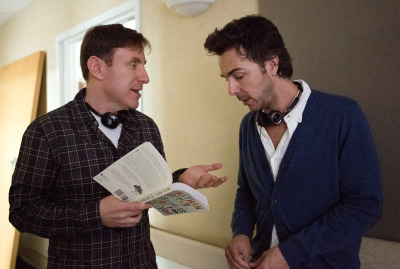Jonathan Tropper is on a roll. Not only did he watch his novel, This is Where I Leave You, shoot to the top of the best-selling charts, but he optioned it to a film studio. Then they asked him to write the screenplay and he got to keep the story and characters as faithful to its original concept as possible, a rarity these days in Hollywood. After seeing the film, which stars an ensemble that includes Jason Bateman and Tina Fey, I felt even closer to the characters he brought to life on celluloid so vividly, and I was eager to talk to him (along with a group of other bloggers by phone) about his writing process and going from book to screen. He was forthcoming and genuinely excited about the film’s upcoming release on Friday. Here’s what we found out.
Q: What can books do better than something on screen?
JT: A movie has the benefit of being able to transport for an hour and a half, two hours with no interruptions and give you the whole story and take you on the entire journey in a kind of encapsulated way. And you just sit back and watch it all unfold. And whereas a book, it’s something that you read over a period of time. And you get interrupted. And you know you have to you know go to sleep or go eat lunch or take care of your kids or go to work. So, the book kind of lingers. But you have to kind of refocus. So, that’s also the plus of the book is that you can live with the characters in the book over a period of weeks, whereas you know a movie you’re done in two hours.
Q: Was it easy to get the book optioned with the focus on the Jewish tradition of the family sitting shiva?
JT: The option happened very fast. The easy part is in getting the book optioned. It’s getting the movie made. That took five years. And the resistance wasn’t to the fact that there was a Shiva in it. I think the resistance was just to the fact that it was a character-driven comedic drama or dramatic comedy. And it was just a hard movie for any studio to fully see as a profitable movie to make until we sort of assembled all the pieces for them.
Q: Were there any scenes that you would have really liked to have put into the movie from the book that were just intrigued you?
You know I mean it’s such an organic process over a long period of time that there’s really such a tremendous amount of compression that has to happen when you move a book to film and when you adapt it. I felt like I really just concentrated on getting the essence of each character in there. I really enjoy a chapter in the book where Judd and his brother and Horry and Boner go outside to see if Paul can still strike out one of his you know buddies from the baseball team back in high school. But that’s sort of a fun scene, and I think in very early drafts I did have that in the movie. But you know ultimately the script just becomes too unwieldy, and you have to really compress it down to its essence, or we’d be looking at you know a Gandhi length movie.
Q: How were you able to influence the storytelling in the film so that it didn’t depart drastically?
JT: Well, the way I influenced that was by being the screenwriter. And the other thing that really I think is the reason that that was able to happen is because Shawn [Levy], who directed the movie, was such a standup and is such a purist in general and the fact that he’s a purist in all the work he does, including this movie. But he was just such a fan of the book that we were actually in this strangely reverse position where the director was actually pushing me to be truer to my own source material than I was being. We had a process where he actually brought me closer to the original source material than I had been with the draft that I had done when he first came on to direct it.
Q: How much input if any did you have in the casting process?
JT: The casting process really belongs to the director and the producers. And the screenwriter will just about never have that kind of input. I was lucky in that I had such a close working relationship with Shawn, having written two other projects for him, that he kept me very much in the loop.But ultimately, this is always going to be Shawn’s vision and Shawn’s ideas for these characters. And I just feel fortunate that his vision of the book hued so closely to my own. So, my role in casting was just to every few days get a very exciting e-mail from him telling me who had signed on, which was very surreal.
Q: How much time did you spend on the set and what was it like?
JT: I spent a lot of time on set. My television show was shooting at the same time. So, I was bouncing back and forth a little bit. But I would say I was on set for you know about 50/55% of the shoot. We shot in the house for 25 days. And because the house was so far from our base camp, normally actors would go back to base camp between setups. But if you have to be back again in an hour, you’re going to spend too much time traveling back and forth. So, everyone just hung out upstairs in this house. And you know these were a lot of actors who some of whom had worked together before and many of whom who hadn’t but were clearly aware of each other. And it sort of was like summer camp for the actors. They got to hang out with a lot of peers and colleagues that they may never have connected with before. They were all in their 30s and 40s. And they’ve got kids. And they’ve got a lot of the same issues that they deal with.
So, there was just a lot of bonding and a lot of hanging out. And it was really a very calm, relaxed atmosphere. I’m told I’ll never experience that on another movie again.
Jonathan is currently adapting One Last Thing Before I Go for Paramount. He is also the co-creator and executive producer of the television show Banshee, which premiered on Cinemax in January 2013 and is currently shooting its third season. He lives in Westchester, NY with his three children. Follow author Jonathan Tropper on Twitter.
This is Where I Leave You starts in theaters nationwide this Friday.









 Follow
Follow





I loved the book. I read it when it first came out, so I knew nothing about it. Then, at the Book Expo in May, I was lucky enough to get into a panel where Tina Fey, Jason Batemen, Sean Levy and Jonathan Tropper spoke about both the book and movie. What a great cast. I now can’t wait to see the movie.
I heard about the panel at BEA! Please let me know what you think of the movie, Jen, and see you at Social Good!
Now we know why the movie did not ruin the story! And what a great interview. You asked questions that I too wondered about! Thank you!
Thanks, Ruth, what a great comment!
How blessed you were to have this interview and that I got to read it! I look forward to seeing this movie, but I must admit I haven’t had a chance to read the book. I don’t always like seeing the movie first, but this time I’ll make an exception.
Yes, Cathy, make an exception with this one.
I’m delighted JT has written the screenplay. That’s always my biggest fear when I hear a book has been made into a film, the chance it’ll be fully messed up in the transfer.
I’m thrilled this opens soon! Now off to draw the winner of my #TIWILY prize package! 😀 (They’ve done a fabulous job drawing on the power of bloggers to promote this picture.)
Yes, I enjoyed running that drawing, too!
I don’t know why I never heard of the book but after seeing the trailer for the movie, I want to read it….and of course I can’t wait to see the movie. Will be tweeting this interview out. Thanks for sharing.
Thanks for stopping by, Tammy.
This is such a good interview. I am reall looking forward to this movie!
Thanks, Doreen!
I LOVE LOVE LOVE EVERYTHING JT writes.
and now? I may actually see the movie 🙂 as I usually avoid booktoFILM.
Yeah, Carla!
Loved the book and this was such a great interview. I too was curious how the Jewish pieces would play into getting the film made, the casting, etc. Great to hear that JT was the screenwriter. Sharing on my blog’s FB page and Twitter. I’m a HUGE JT fan, and of course, a Holly fan.
Ditto, my friend.